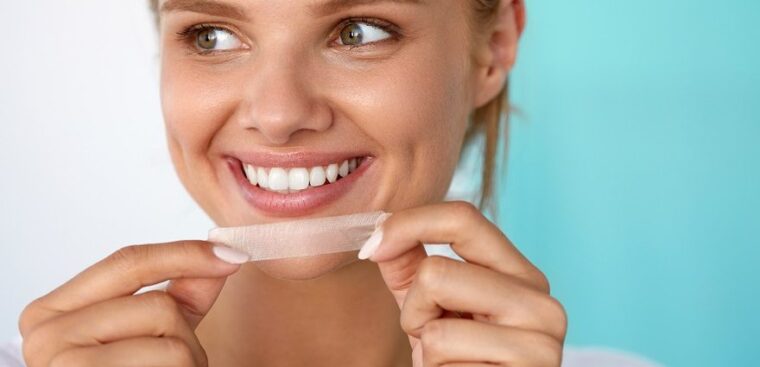In the pursuit of pearly white teeth, Big Pharma and every drug company in between confront us with a burgeoning market of teeth-whitening products, each promising a whiter, brighter, shinier smile. However, behind the dazzle of commercial appeal lies a question of substance — how effective and safe are these products?
For decades, the quest for a captivating smile has driven a narrative that white teeth equate to health and vitality. This has fueled a multimillion-dollar industry, but not without raising concerns among dental professionals and consumers alike.
The Pursuit of the Perfect Smile

To understand the gravity of these concerns, let’s look into the mechanics of teeth whitening. The most common active ingredients in whitening products are hydrogen peroxide or carbamide peroxide. These agents break down to release oxygen molecules that penetrate the enamel and dentin, bleaching coloured substances while leaving the tooth’s structure intact.
Over-the-counter (OTC) products, from whitening toothpaste to strips and gels, typically contain lower concentrations of these active ingredients compared to professional treatments administered by dentists. Yet, the effectiveness of these products varies widely, and users often have unrealistic expectations influenced by aggressive marketing campaigns.
The Efficacy Question

A deep dive into studies and clinical trials suggests that while many teeth whitening products are indeed effective in removing surface stains and altering teeth colouration, the extent and duration of their effectiveness are contingent upon the concentration of active ingredients and the method of application. Hence, higher concentrations applied by professionals tend to yield more pronounced and longer-lasting results.
Nevertheless, the efficacy of these products is not universally consistent. Variations in individual oral health, the nature of tooth discolouration, and the presence of restorations like crowns or veneers can all affect outcomes. Moreover, overuse or misuse of whitening products can lead to diminished results and a host of oral health issues.
Safety Concerns and Side Effects

The safety profile of teeth whitening products is relatively well-documented, but not without caveats. The General Dental Council (GDC) approves certain whitening products; however, the endorsement stipulates that consumers follow product guidelines precisely and consult a dental professional before adopting these products.
Otherwise, misuse of whitening agents can lead to side effects such as tooth sensitivity and gum irritation. In extreme cases, improper use can cause enamel degradation or chemical burns on the gums. Another issue is that there haven’t been enough long-term studies on the effects of chronic use of these products, leaving a grey area in our understanding of their safety over time.
The phenomenon known as “bleachorexia” – an unhealthy obsession with teeth whitening – is a testament to the potential psychological ramifications of the whitening culture. This addiction can lead individuals to overuse products, striving for an unnatural level of tooth brightness and risking their oral health in the process.
Regulatory Oversight and Professional Guidance

Because they are classified as cosmetics by the Medicines and Healthcare Products Regulatory Agency (MHRA), teeth-whitening products are subject to less stringent scrutiny than drugs. In order to prevent misuse, this classification has prompted dental specialists to advocate for stricter regulations and clearer labelling.
When it comes to teeth whitening, hardly anyone can claim to have more insight than dental practitioners as they assume a vital function in directing patients through the complex landscape of whitening alternatives. Without a comprehensive dental examination and an individualised treatment strategy from a professional practitioner, minimising risks and attaining desired results with minimal side effects is almost unattainable.
As such, in-office professional whitening continues to be regarded as the gold standard by dentists and teeth whitening enthusiasts due to its prompt outcomes and the medical supervision offered throughout the procedure.
In Conclusion
Teeth whitening products are in a tricky middle ground between being a purely cosmetic purchase and a medical requirement. Yes, they may help people feel more confident and have brighter smiles, but they are not risk-free. The effective and safe use of these products requires an informed public, conscientious manufacturers, and watchful regulatory authorities, all working together to ensure that the pursuit of the perfect smile doesn’t overwhelm the primary objective of good oral health.
Do you live in the UK and would like the informed guidance of a dental professional in choosing a whitening product? Maybe you’d rather have an in-house whitening procedure done altogether to save you the hassle and uncertain outcomes? Check out Zen Dental, the premier dentist Banstead and surrounding Surrey town residents consult for the best oral care.
